

Comment vivre à 25 ans dans un monde qui meurt ? Comment vivre à 25 ans dans un monde qui meurt ? Log In or Sign Up. Vivre en couple : Va, Vis et Deviens. Chacun peut et doit améliorer le monde (The Wild Immersion) ! Rébecca Kleinberger: Why you don't like the sound of your own voice. Laura Vanderkam: How to gain control of your free time. Youtube. Leo Igwe: Why I choose humanism over faith. Could Singapore hold the secret to preparing workers for the future?
Mariah Llanes In 1965, unemployment in Singapore was in the double digits.
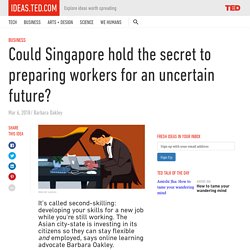
Workforce literacy was 57 percent. Singapore could have been like many of the other struggling colonies spun off from the British Empire after World War II — but it turned out differently. Today Singapore has roughly 2.0 percent unemployment, among the lowest in the world. Its per-person gross domestic product is more than 3oo percent of the global average. Robert Lang: The math and magic of origami. Championne de France de cyber-harcèlement. Robert Lang: The math and magic of origami. Robert Lang: The math and magic of origami. Manuel Lima: A visual history of human knowledge. R. Luke DuBois: Insightful human portraits made from data. Stuart Russell: 3 principles for creating safer AI. The transformational power of multinational business. The incredible inventions of intuitive AI.
La raison pour laquelle le seul futur qui mérite d'être conçu inclut tout le monde. Tim Urban: Inside the mind of a master procrastinator. Will automation take away all our jobs? iStock Here’s a startling fact: in the 45 years since the introduction of the automated teller machine, those vending machines that dispense cash, the number of human bank tellers employed in the United States has roughly doubled, from about a quarter of a million in 1970 to a half a million today, with 100,000 added since the year 2000.
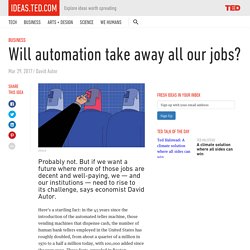
These facts, revealed in Boston University economist James Bessen’s recent book Learning by Doing, raise an intriguing question: What are all those tellers doing, and why hasn’t automation eliminated their employment by now? If you think about it, many of the great inventions of the last 200 years were designed to replace human labor. Tractors were developed to substitute mechanical power for human physical toil.
Assembly lines were engineered to replace inconsistent human handiwork with machine perfection. Automating a subset of a position’s tasks doesn’t make the other ones unnecessary — in fact, it makes them more important. Seth Godin: How to get your ideas to spread. TEDxYouth@BrookhouseSchool. Three Myths of Behavior Change - What You Think You Know That You Don't: Jeni Cross at TEDxCSU. The New “Disrupters” in Healthcare – Patients and Pharmacists. Change anything! Use skillpower over willpower: Al Switzler at TEDxFremont.
Three Myths of Behavior Change - What You Think You Know That You Don't: Jeni Cross at TEDxCSU. Et si gentillesse et bienveillance rimaient avec performance collective. Plug into your power! Eduardo Briceño: How to get better at the things you care about. Arthur Benjamin: Teach statistics before calculus! This is your brain on communication. Imagine that a device was invented which could record all of my memories, dreams and ideas, and then transmit the entire contents to your brain.
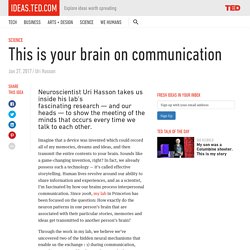
Sounds like a game-changing invention, right? In fact, we already possess such a technology — it’s called effective storytelling. Human lives revolve around our ability to share information and experiences, and as a scientist, I’m fascinated by how our brains process interpersonal communication. Since 2008, my lab in Princeton has been focused on the question: How exactly do the neuron patterns in one person’s brain that are associated with their particular stories, memories and ideas get transmitted to another person’s brain?
In one experiment, we brought people to the fMRI scanner and scanned their brains while they were either telling or listening to real-life stories. However, immediately as the story started, we saw something amazing happen. So, we experimented. Then, we took the words and built sentences from them. 7 lessons about finding the work you were meant to do. Emily Pidgeon Whether it was during a career aptitude test or in a heart-to-heart chat after getting laid off, chances are someone has talked to you about how to “find your calling.”
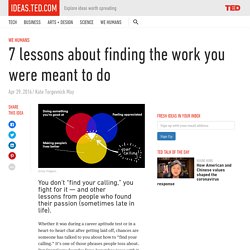
It’s one of those phrases people toss about. But StoryCorps founder Dave Isay takes issue with it … specifically, the verb. What are you revealing online? Much more than you think. What can be guessed about you from your online behavior?
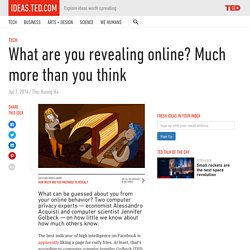
Two computer privacy experts — economist Alessandro Acquisti and computer scientist Jennifer Golbeck — on how little we know about how much others know. The best indicator of high intelligence on Facebook is apparently liking a page for curly fries. At least, that’s according to computer scientist Jennifer Golbeck (TED Talk: The curly fry conundrum), whose job is to figure out what we reveal about ourselves through what we say — and don’t say — online. Of course, the lines between online and “real” are increasingly blurred, but as Golbeck and privacy economist Alessandro Acquisti (TED Talk: Why privacy matters) both agree, that’s no reason to stop paying attention.
TED got the two together to discuss what the web knows about you, and what we can do about the things we’d rather it forgot. Danny Dorling: Maps that show us who we are (not just where we are) Beau, Bien, Bon, programmez votre cerveau pour le bonheur. Et si chacun faisait sa part ? Madeleine Albright: On being a woman and a diplomat. À 13 ans, il décide de ne plus aller à l'école. Écoutez pourquoi, c'est incroyable !
Rainer Strack: The workforce crisis of 2030. What are the ethics of using young blood to halt aging? In June, Stanford biologist Tony Wyss-Coray took the TED stage to describe no less than “an absolutely amazing development in aging research” (How young blood might help reverse aging.
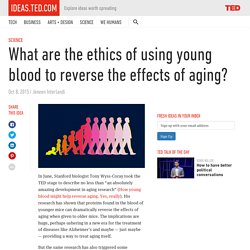
Yes, really). His research has shown that proteins found in the blood of younger mice can dramatically reverse the effects of aging when given to older mice. The implications are huge, perhaps ushering in a new era for the treatment of diseases like Alzheimer’s and maybe — just maybe — providing a way to treat aging itself. But the same research has also triggered some hand-wringing, and it’s not hard to guess why. Jonas Eliasson: How to solve traffic jams. Adam Grant: The surprising habits of original thinkers. How a TED Talk inspired me to leave work to go live on a remote island. Winston Chen left his job at a software company in Boston and moved his family to the island of Rødøy, population 108, for a year.
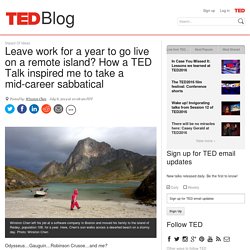
Here, Chen’s son walks across a deserted beach on a stormy day. TED-Ed - Journal. Faire rayonner l'esprit de Défense. Can your biome make you fat? Emily Pidgeon/TED Is there a correlation between your biome and your BMI?
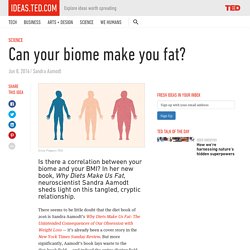
In her new book, Why Diets Make Us Fat, neuroscientist Sandra Aamodt sheds light on this tangled, cryptic relationship. There seems to be little doubt that the diet book of 2016 is Sandra Aamodt’s Why Diets Make Us Fat: The Unintended Consequences of Our Obsession with Weight Loss — it’s already been a cover story in the New York Times Sunday Review. But more significantly, Aamodt’s book lays waste to the diet-book field — and indeed the entire dieting field — with the radical assertion that it is, in fact, exactly the kind of weight loss generated by diets that prompt your body to regain the weight lost — whether you want to or not.
David Brooks: Should you live for your résumé ... or your eulogy? Tabetha Boyajian: The most mysterious star in the universe. Kenneth Lacovara: Hunting for dinosaurs showed me our place in the universe. Mia Birdsong: The story we tell about poverty isn't true. Sarah Gray: How my son's short life made a lasting difference. Maslow's Human Needs : TED Radio Hour. Mia Birdsong: The story we tell about poverty isn't true. Kenneth Lacovara: Hunting for dinosaurs showed me our place in the universe. Sarah Gray: How my son's short life made a lasting difference. Adam Leipzig only needs five minutes to help you find your life purpose. Gallery: Archaeological mysteries hidden in satellite images. Archaeologists have many tools at their disposal: shovels, trowels, satellites.
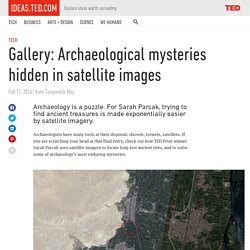
If you are scratching your head at that final entry, check out how TED Prize winner Sarah Parcak uses satellite imagery to locate long-lost ancient sites, and to solve some of archaeology’s most enduring mysteries. The mystery: What happened to Itj-tawy, the ancient capital of Egypt? Itj-tawy, once located on the bank of the Nile, was Egypt’s capital for about 350 years during the period known as the Middle Kingdom. But sometime after 1785 BC, when the capital moved to Thebes, Itj-tawy disappeared. “Egyptologists knew the city had to be somewhere near the pyramids of the two kings who built it, but that only narrowed it down to an area about four miles by three miles in size,” says Parcak.
The mystery: What did the lost city of Tanis look like? Archaeologists have explored the tombs and temples of Tanis since the mid-1800s.